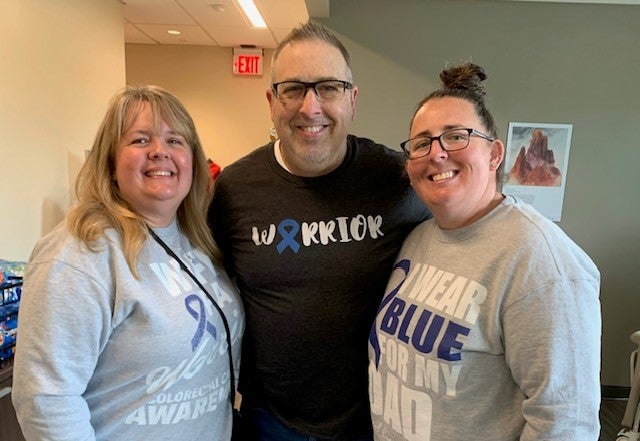“My wife told me they’d found cancer,” Daugherty recalled.
You might think there’d be nothing scarier than facing a brain tumor. That’s what Jeremy Daugherty thought, too. And he’d faced two of them. But when he woke from a routine colonoscopy last November, his perspective changed. Quickly.
“My wife told me they’d found cancer,” Daugherty recalled.
He was scheduled for surgery in less than two weeks. But that was before the results from some additional scans came back. What the MRI showed was that his cancer was not Stage 1 as they’d thought. It was actually Stage 3A, which meant the cancer had spread and the lymph nodes were involved. Things were about to get much more challenging.
As a surgical nurse manager, Daugherty had spent practically his entire career inside ORs. But instead of being on the operating table himself for a (hopefully) expedited treatment, he’d be facing a long course of radiation and chemotherapy before surgery.
“It’s a very typical treatment path when there’s lymph node involvement,” he said. “Thankfully this type of colorectal cancer is very curable when treated early.”
And that’s something he’s been emphasizing to his family, friends, and colleagues as they’ve learned about his diagnosis.
“The new protocol for a first screening colonoscopy is age 45 now. I’d just turned 50 and put it off until after a knee replacement surgery, but I had a few symptoms that added some urgency. It’s a good thing I went when I did.”
The first phase of Daugherty’s care involved 25 radiation treatments, which he was able to receive just a few steps from his office at Mount Carmel Grove City.
“We’re very fortunate to have these services on our campus, and we have such an amazing radiation oncology team,” he said. “I was able to go from meetings to treatment and back without even changing out of my scrubs. We built a bond, which is something I’ve heard so many of our patients say. When I had to have treatment on my birthday, they even had a little celebration for me. Ringing the bell to end the first phase of my treatment was an emotional moment. And the treatments shrunk the growth significantly.”
While he somehow managed not to miss work during radiation, the second phase of treatment, which Daugherty’s undergoing now, has been more taxing. He started with 14 days of oral chemotherapy then went to IV. Each infusion lasts four hours. The fatigue, pain and other side effects have been significant, and he’s typically had to miss a day or two of work after.
“I feel like I cheated with the brain tumors,” he joked. “Being able to just have surgery feels like a shortcut now. It’s been a real fight this time. But my wife has been incredible – just an amazing source of support. And my boss, staff and the entire hospital have been so supportive.”
He’s felt a tremendous amount of support as he finished the last of his IV Chemo therapy treatment in late April.
“Our goal was to be done in early May, take 4-5 weeks off, then have my surgery in June.”
Being a patient again has also given him a new perspective on what it means to provide the best care.
“It’s easy to forget the road that leads to the surgical door,” Daugherty said. “But it’s so important to remember that everyone has a story and a path that led them to us.”
“I also think it helps to share your journey with the people in your circle – no matter how small it is. I tell people I’ve interacted with to make sure they get screened. And that while the colonoscopy process may not be pleasant, it just might save your life. If I could get one person to get screened by telling my story, it will have been worth it.”
June 4th is National Cancer Survivor Day and we honor and celebrate all survivors in sharing Jeremy’s story, as there are many more like his. To learn more about our cancer care services and programs, visit Cancer Care, Mount Carmel Health, Columbus, OH.
Also, if you’re age 45 or older and at average risk for colon cancer, a colonoscopy is the best, most thorough screening available. To schedule yours, visit Mount Carmel Colon & Rectal Surgery (mountcarmelhealth.com) or call 614-627-1560 today.

